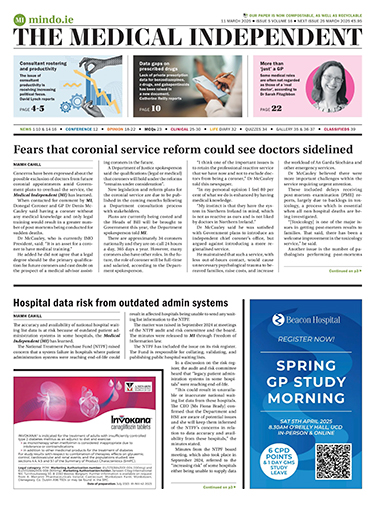The establishment of a nationwide fracture liaison service (FLS) could dramatically reduce fracture rates in elderly patients a national report has found.
Ireland’s fracture liaison service database has published its first national report on fragility bone fractures in Ireland. The report recommends the establishment of FLS in hospitals throughout the country, “which could lead to major reductions in the number of fractures suffered by people as they age”.
The aim of the FLS is to provide a system for assessing people over 50 years of age who sustain a low-trauma ‘fragility’ fracture, to diagnose osteoporosis and identify those most at risk of future falls and more serious fractures such as those of the hip or spine.
It is estimated that 30,000 non-hip fragility fractures occur annually in Ireland. The treatment of fragility fractures accounts for approximately 2 per cent of the total healthcare spend in Ireland and costs the health service over €400 million per annum.
Mr Paddy Kenny, Joint National Clinical Lead for RCSI National Clinical Programme for Trauma and Orthopaedic Surgery welcomed this first report stating: “The development of a Fracture Liaison Services Database is a key enabler in implementing recommendation 15 of the 2018 HSE report – A Trauma System for Ireland.
“Having Irish data will facilitate policy makers to plan service delivery more effectively and efficiently into the future. I commend the national clinical leads in promoting the work that this group has completed to date and welcome the recent appointment of eight advanced nurse practitioners for fracture liaison services nationally.”
Prof Frances Dockery, joint clinical lead for the Fracture Liaison Service Database said: “This report provides a benchmark for future service developments in Ireland. The lack of investment in a national fracture liaison service needs to be addressed as a matter of urgency so that all 16 hospitals that receive trauma patients with fractures in Ireland can establish a fully-staffed FLS, and contribute data to the National FLS Database to monitor the standards of care their patients receive”.
Mr Aaron Glynn, joint clinical lead for the database, said that “Fracture liaison service should be considered an essential ‘secondary prevention’ service, and as such is an enabler in improving patient health and wellbeing.”













Leave a Reply
You must be logged in to post a comment.